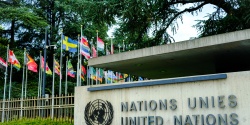Published: 21.12.2022

The Office of the President of the Republic of Poland has responded to an appeal by Ordo Iuris, in which the Institute points out that the UN General Assembly resolution on violence against women could be a tool to pressure states to position the so-called right to abortion as a human right. Before and after the document's adoption, the Institute issued appeals to the President highlighting the dangers of the resolution and calling for opposition to the UN's imposed interpretation of human rights. The Office of the President of the Republic of Poland responded by pointing out that UNGA resolutions are not binding and thus cannot pose a threat. In response, the Institute noted that despite the resolution's formally non-binding nature, its adoption could contribute to the creation of a "customary right to abortion," which Poland will be forced to recognize if it does not object to the concept in time. The resolution was adopted in September and calls on member states to recognize "reproductive rights," including the right to "safe abortion."
In September, the UN General Assembly adopted a resolution on international cooperation on access to justice, remedies and support for victims of sexual violence. The document, under the guise of addressing violence against women and girls, calls on states to "promote and protect reproductive rights," including providing access to "safe and effective methods of modern contraception," "emergency contraception" (which are essentially early abortifacients) and "safe abortion." Thus, the resolution pushes an arbitrary interpretation of international law that recognizes abortion as a human right. While no international treaty grants anyone the "right to abortion" or the "right to contraception," in practice, for many years some international bodies have argued that these rights derive from the right to privacy and even the right to life.
The Ordo Iuris Institute sent two letters to Polish President Andrzej Duda urging him to oppose this interpretation of human rights at the UN (one on August 31, before the General Assembly meeting, and the other on September 19). In both letters, the Institute warned that while a UN General Assembly resolution has no formal binding force, in practice it can become a tool for the development of customary law, which is already binding on states. In turn, international custom could force Poland to recognize a "right to abortion" or a "right to early abortion remedies," even though it has not signed any treaty establishing such rights. The only way to avoid such a scenario is for Poland - represented internationally by its president, among others - to express unequivocal opposition to such interpretations of human rights treaties.
The Polish president, however, did not take the steps called for by the Ordo Iuris Institute. On behalf of the head of state, Małgorzata Paprocka, secretary of state in the President's Chancellery, responded, pointing out in a letter dated November 21 that the resolution is non-binding, and furthermore explicitly stipulates that the right of access to abortion mentioned therein "applies only when it is permissible under national law." In addition to this, Minister Paprocka stressed that even if a customary right to abortion were to be carved out, the Polish authorities could "terminate" it by analogy with the termination of a treaty.
In response to the letter from the president's representative, the Ordo Iuris Institute sent another letter, explaining that the resolution, despite its non-binding nature, could play a fundamental role in recognizing abortion as a human right. This is because the act comes from the highest UN body, the General Assembly, which represents the international community of the entire world. For this reason alone, the importance of this resolution should not be underestimated. In the letter, the Ordo Iuris Institute also explained that the resolution's caveat about limiting access to abortion to cases permitted by national law could be disregarded by international bodies in the future.
"More and more international bodies are pushing for the recognition of the possibility of killing an unborn child as a human right - the UN Human Rights Committee, the UN Committee on Economic, Social and Cultural Rights, the UN Committee on the Elimination of Discrimination against Women, the Parliamentary Assembly of the Council of Europe, and now the UN General Assembly. We believe that there is a real risk of forming a customary interpretation of human rights treaties that "injects" access to abortion into Poland's recognized fundamental rights such as the right to respect for private life, the prohibition of torture, the right to health or even the right to life. An international custom is born when a majority of states accept it, if only tacitly, without expressing opposition. Such custom has full binding force, equal to treaties. By this sublime means, Poland may be forced in the future to legalize abortion on demand, if only against the will of the majority of the population, in accordance with the principle of "human rights are not argued with." According to the well-established position of the doctrine of international law, the only effective way to avoid binding Poland to the "customary right to abortion" is for the Polish authorities - preferably by the President of the Republic - to unequivocally oppose such an interpretation of human rights. We hope that our legal argumentation will convince the President to take concrete steps," stressed Weronika Przebierała, director of the International Law Center of the Ordo Iuris Institute.

• Amendments to the directive on the rights of victims of crime are currently under consideration in the European Parliament.

09.06.2025
Presidential elections, which have just taken place in Poland, were won by the candidate supported by the opposition. According to the law, the validity of the elections should be decided by the Extraordinary Review and Public Affairs Chamber of the Supreme Court. However, the government is questioning the competence of this chamber, which could be interpreted as an attempt to obstruct the transfer of power to the newly elected president.

The candidate supported last Sunday by all the Right for the second round of the Polish presidential election had promised that he would veto any law that liberalizes abortion. He won with 50.89% of the votes against the left-liberal candidate who had promised to ratify any law liberalizing abortion.

04.06.2025
There is a lot of hard work ahead of us, though. Our teams of experts have been working for months not only on stopping the destruction of the state by Donald Tusk, but – most importantly – we are preparing a series of projects and analyses that will make